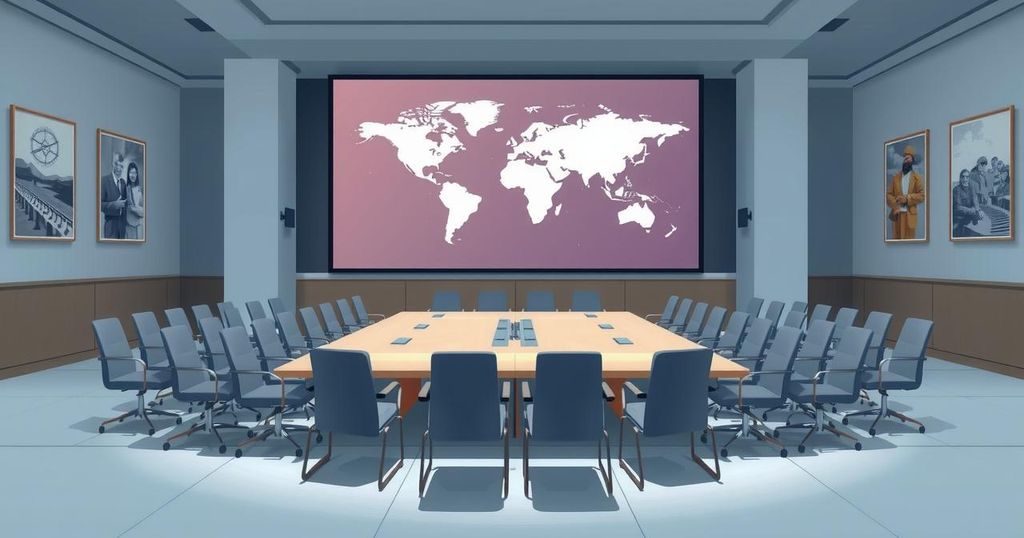UN Conference Addresses Human Rights Violations and Executions in Iran

A conference at the UN European headquarters addressed the serious human rights violations in Iran, emphasizing the surge in executions. Speakers included legal experts and former political prisoners who called for international accountability and stronger actions against the Iranian regime’s ongoing crimes, particularly the 1988 massacre of political prisoners.
On March 13, 2025, a significant conference was convened at the United Nations European headquarters in Geneva during the 58th session of the UN Human Rights Council. This event focused on the alarming human rights situation in Iran, particularly the increase in executions. Attendees included political figures, legal experts, former political prisoners, and relatives of executed individuals, all emphasizing the urgent need for international accountability against the Iranian regime.
Prominent speakers at the conference included notable individuals such as Kirsty Brimelow, former Chair of the Human Rights Committee of the Bar of England and Wales, and Claude Nicati, former Deputy Attorney General of Switzerland. Also present were Senator Roberto Rampi of Italy, human rights advocate Sahar Sanaii, and Behrooz Maqsoudi, a family member of executed political prisoners. Each speaker contributed critical insights on the ongoing human rights violations in Iran.
Mojgan Joulaee opened the conference with a stark warning regarding the rise in executions and the broader context of human rights abuses in Iran. She highlighted the need for increased international scrutiny and collective action to seek justice for victims and their families. This sentiment resonated throughout the event, emphasizing the cries for intervention.
Kirsty Brimelow provided a detailed account of the 1988 massacre of political prisoners, identifying it as a systematic assault on civilians that culminated in approximately 30,000 executions. She underscored the violation of international human rights treaties and the ongoing lack of accountability for perpetrators, many of whom occupy prominent positions in the Iranian government. Brimelow advocated for the preservation of evidence to facilitate future trials against those complicit in these atrocities.
Claude Nicati addressed the assassination of Dr. Kazem Rajavi, a noted human rights defender, in 1990. He asserted that the absence of accountability has permitted the Iranian regime to continue its execution policies unabated. Nicati cautioned that without serious international action, the current wave of executions would persist, dismissing the regime’s claims of judicial fairness as mere propaganda.
Sahar Sanaii spoke passionately about the regime’s gender-based violence, highlighting Iran’s alarming rate of female executions. Despite extreme oppression, Iranian women have been at the forefront of the struggle for freedom, evident during the uprisings of 2022. She emphasized the critical role of international support for women fighting for their rights in Iran.
Senator Roberto Rampi condemned the Iranian regime’s tactic of state hostage-taking, citing instances where Western nationals were detained to leverage government concessions. He pointed to the cases of Assadi and Hamid Noury, stressing that recent leniency from Western nations emboldened the regime’s perilous policies of human rights violations and terrorism.
Behrooz Maqsoudi shared a personal account of loss, disclosing that three of his uncles were executed due to their political beliefs in the 1980s. He highlighted the importance of advocacy efforts, such as the “No to Executions” campaign, which continues to gain traction despite the regime’s violent crackdowns.
Behzad Naziri concluded the conference by linking the 1988 massacre to the recent surge in executions. He called upon the international community to extend the UN Special Rapporteur’s mandate and increase investigations into Iran’s ongoing human rights violations. Collectively, the speakers urged the international community to adopt stronger diplomatic and legal measures against Iran to curb its oppressive practices.
The conference highlighted the ongoing human rights violations in Iran, emphasizing the urgent need for international accountability regarding the Iranian regime’s actions, particularly concerning the surge in executions. With speakers advocating for stronger intervention and investigations into the regime’s abuses, the call for a unified global response becomes increasingly essential as Iran continues its brutal repression of dissent and opposition.
Original Source: www.ncr-iran.org








